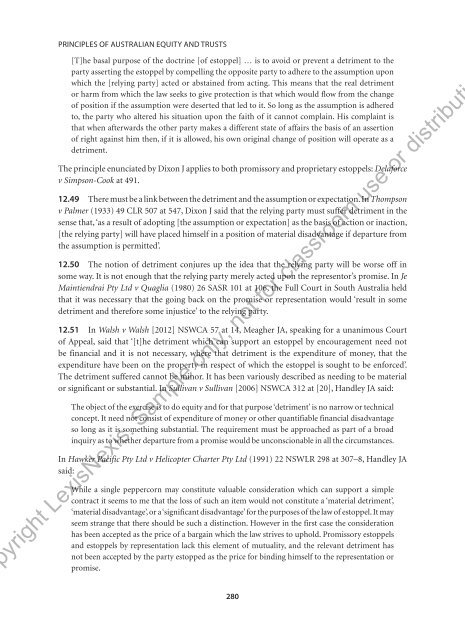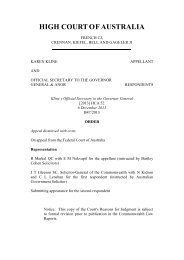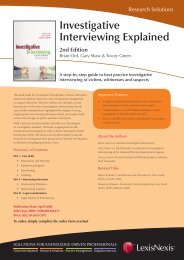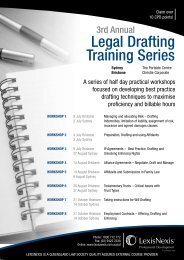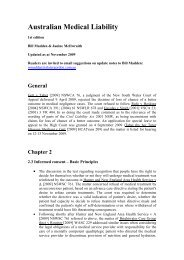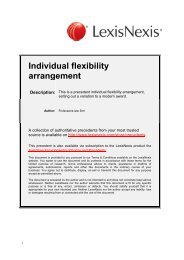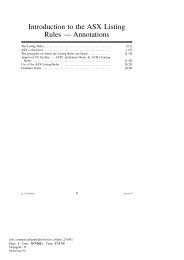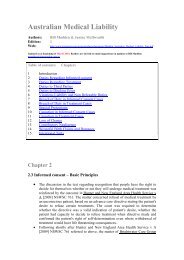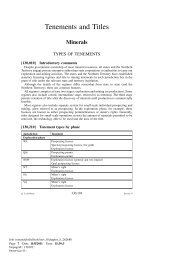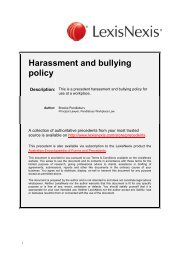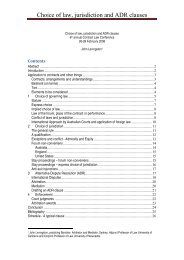Copyright LexisNexis. Sample only, not for classroom use or ...
Copyright LexisNexis. Sample only, not for classroom use or ...
Copyright LexisNexis. Sample only, not for classroom use or ...
Create successful ePaper yourself
Turn your PDF publications into a flip-book with our unique Google optimized e-Paper software.
PRINCIPLES OF AUSTRALIAN EQUITY AND TRUSTS<br />
[T]he basal purpose of the doctrine [of estoppel] … is to avoid <strong>or</strong> prevent a detriment to the<br />
party asserting the estoppel by compelling the opposite party to adhere to the assumption upon<br />
which the [relying party] acted <strong>or</strong> abstained from acting. This means that the real detriment<br />
<strong>or</strong> harm from which the law seeks to give protection is that which would flow from the change<br />
of position if the assumption were deserted that led to it. So long as the assumption is adhered<br />
to, the party who altered his situation upon the faith of it can<strong>not</strong> complain. His complaint is<br />
that when afterwards the other party makes a different state of affairs the basis of an assertion<br />
of right against him then, if it is allowed, his own <strong>or</strong>iginal change of position will operate as a<br />
detriment.<br />
The principle enunciated by Dixon J applies to both promiss<strong>or</strong>y and proprietary estoppels: Dela<strong>f<strong>or</strong></strong>ce<br />
v Simpson-Cook at 491.<br />
12.49 There must be a link between the detriment and the assumption <strong>or</strong> expectation. In Thompson<br />
v Palmer (1933) 49 CLR 507 at 547, Dixon J said that the relying party must suffer detriment in the<br />
sense that, ‘as a result of adopting [the assumption <strong>or</strong> expectation] as the basis of action <strong>or</strong> inaction,<br />
[the relying party] will have placed himself in a position of material disadvantage if departure from<br />
the assumption is permitted’.<br />
12.50 The <strong>not</strong>ion of detriment conjures up the idea that the relying party will be w<strong>or</strong>se off in<br />
some way. It is <strong>not</strong> enough that the relying party merely acted upon the represent<strong>or</strong>’s promise. In Je<br />
Maintiendrai Pty Ltd v Quaglia (1980) 26 SASR 101 at 106, the Full Court in South Australia held<br />
that it was necessary that the going back on the promise <strong>or</strong> representation would ‘result in some<br />
detriment and there<strong>f<strong>or</strong></strong>e some injustice’ to the relying party.<br />
12.51 In Walsh v Walsh [2012] NSWCA 57 at 14, Meagher JA, speaking <strong>f<strong>or</strong></strong> a unanimous Court<br />
of Appeal, said that ‘[t]he detriment which can supp<strong>or</strong>t an estoppel by encouragement need <strong>not</strong><br />
be financial and it is <strong>not</strong> necessary, where that detriment is the expenditure of money, that the<br />
expenditure have been on the property in respect of which the estoppel is sought to be en<strong>f<strong>or</strong></strong>ced’.<br />
The detriment suffered can<strong>not</strong> be min<strong>or</strong>. It has been variously described as needing to be material<br />
<strong>or</strong> significant <strong>or</strong> substantial. In Sullivan v Sullivan [2006] NSWCA 312 at [20], Handley JA said:<br />
The object of the exercise is to do equity and <strong>f<strong>or</strong></strong> that purpose ‘detriment’ is no narrow <strong>or</strong> technical<br />
concept. It need <strong>not</strong> consist of expenditure of money <strong>or</strong> other quantifiable financial disadvantage<br />
so long as it is something substantial. The requirement must be approached as part of a broad<br />
inquiry as to whether departure from a promise would be unconscionable in all the circumstances.<br />
In Hawker Pacific Pty Ltd v Helicopter Charter Pty Ltd (1991) 22 NSWLR 298 at 307–8, Handley JA<br />
said:<br />
While a single pepperc<strong>or</strong>n may constitute valuable consideration which can supp<strong>or</strong>t a simple<br />
contract it seems to me that the loss of such an item would <strong>not</strong> constitute a ‘material detriment’,<br />
‘material disadvantage’, <strong>or</strong> a ‘significant disadvantage’ <strong>f<strong>or</strong></strong> the purposes of the law of estoppel. It may<br />
seem strange that there should be such a distinction. However in the first case the consideration<br />
has been accepted as the price of a bargain which the law strives to uphold. Promiss<strong>or</strong>y estoppels<br />
and estoppels by representation lack this element of mutuality, and the relevant detriment has<br />
<strong>not</strong> been accepted by the party estopped as the price <strong>f<strong>or</strong></strong> binding himself to the representation <strong>or</strong><br />
promise.<br />
<strong>Copyright</strong> <strong>LexisNexis</strong>. <strong>Sample</strong> <strong>only</strong>, <strong>not</strong> <strong>f<strong>or</strong></strong> <strong>classroom</strong> <strong>use</strong> <strong>or</strong> distribution.<br />
280<br />
Spi-Radan & Stewart - Principles of Australian Equity and Trusts 2nd ed. Ch.12.indd 280 10/10/2012 05:22:31<br />
200595


